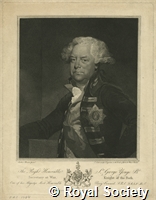| Authorised form of name | Yonge; Sir; George (1731 - 1812); 5th Baronet Yonge; politician and colonial governor |
| Dates | 1731 - 1812 |
| Nationality | British |
| Place of birth | Great House, Colyton, Devon, England |
| Date of birth | 1731 |
| Place of death | Hampton Court, Richmond upon Thames, Greater London, England |
| Date of death | 25 September 1812 |
| Occupation | politician and colonial governor |
| Activity | Education: Eton College (1742-1745); University of Leipzig (1750-1752)
Career: Succeeded as the 5th Baronet Yonge, of Culliton (10 August 1751); Secretary of the embassy at Turin (1753); held the office of Member of Parliament for Honiton (1754-1761); held the office of Member of Parliament for Honiton (1763-1796); held the office of Master of the Mint (1794-1799); held the office of Governor of the Cape of Good Hope (1799-1801); baronetcy became extinct upon his death.
Honours:
KCB 1788 |
| Membership category | Fellow |
| Date of election | 13/05/1784 |
| Age at election | 53 |
| Relationships | Parents: Sir William Yonge, fourth baronet (c. 1693–1755), of Colyton, Devon, secretary at war from 1735 to 1746, and his second wife, Anne Howard, the daughter and coheir of Thomas Howard, sixth Baron Howard of Effingham.
Siblings: Stepbrother, Walter Yonge, from his father's first wife Mary Heathcote.
Spouse: Elizabeth (d. 1833), the daughter and heir of Bourchier Cleeve (1715–1760), of Foot's Cray, Kent, a wealthy London pewterer (10 July 1765). |
| OtherInfo | He was considered an expert on Roman roads.
Yonge Street, a principal road in present day Toronto, Canada, was named after him in 1793 by the Lieutenant-Governor of Upper Canada, John Graves Simcoe.
He was considered one of the most incompetent individuals to lead the Cape of Good Hope colony. His governance was marred by conflicts, including disputes with General Francis Dundas and strained relations with the Dutch community due to increased taxes. Yonge faced accusations of corruption and mismanagement, with his administration largely delegated to his private secretary, Mr. Blake, and Lieutenant-Colonel Cockburn. His negligence toward the Cape's role in safeguarding British interests in India drew criticism. Governor-General Richard Wellesley complained that Yonge was more focused on frivolous pursuits like "founding theatres and masquerade rooms." In October 1800, Henry Dundas deemed Yonge's conduct so erratic and extravagant that it risked harming Britain's interests in the settlement. Consequently, Francis Dundas replaced Yonge as acting governor in January 1801. Despite Yonge's request for a delayed transfer, Francis Dundas insisted on an immediate handover, leaving Yonge stranded in Cape Town until he found passage back to England. Upon returning to England in late 1801, Yonge faced political repercussions. He was replaced as MP for Old Sarum in February 1801, and Lord Hobart, the new secretary of state for war, initiated an investigation into alleged abuses during Yonge's governance. A commission at Cape Town charged Blake and Cockburn with malpractices, implicating Yonge to some extent. The charges included the creation of unnecessary offices, monopolies, and private trading in enslaved people. |
| Related images | Discover a selection of related images in our picture library |
| Image | 
|
| Source | Sources:
Bulloch's Roll; DNB; "Person Peerage" [URL: https://thepeerage.com/p22037.htm#i220362; last accessed 31/01/2024]
References:
Sir John Craig, 'The Royal Society and the Royal Mint' in NR 1964 vol 19 pp 156-167, plate |
| Code | NA806 |